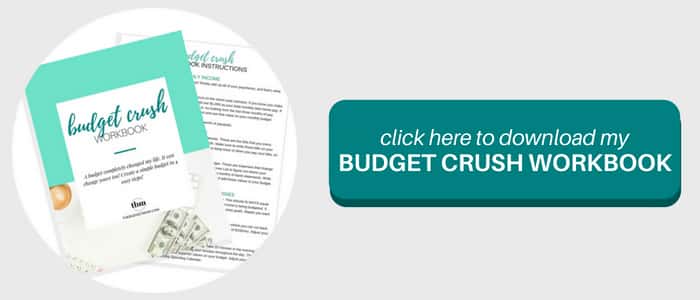
This is article five of Part One of the “Conquering Debt Series.” Read article four of Part One here.
The most important category in my budget is savings. This might be surprising to some, but having money set aside for large purchases or emergencies is crucial for a healthy financial future. It's even more critical if you are trying to pay down debt. Think of it this way. You can't change your financial situation if you keep adding more holes to an already sinking ship. If you continue to accrue more debt because you can't afford little emergencies or unexpected expenses, you will never pay off your debt.
The best way to prevent future financial problems is to set money aside each week, if possible in a savings account. This will help eliminate expensive borrowing in the future. When you have debt, the only way to do this is to figure out how to allocate your resources so that there is something left over each month for savings.
I know it is sometimes difficult to think about saving money in a society that bombards you with advertisements and encourages you to spend money you don't have. However, in making your budget, you should carefully consider whether you can set aside even a tiny amount each week for savings as a cushion against future problems.
Before I type any more, I want to give a word of caution.
There are some credit card companies out there that offer a savings plan that is attached to your credit cards. Though it might work for some, if you have debt, I highly suggest you stay away from this form of saving. The problem with credit card savings programs is that the creditor contributes to your savings account only if you use your credit card. One reason I urge caution is that this might encourage you to spend more to save more. This is not going to help you in the long run if you are spending beyond your budget. It's especially dangerous if you don't pay off your balance every month and end up paying a much higher interest rate on your credit card payments than the low interest rate on a typical savings account.
WHAT TO KNOW WHEN OPENING A BANK ACCOUNT
If you are spending money on cashing checks or buying money orders every month, you can avoid those costs by opening a bank or credit union checking account. Make sure to shop around to find an account that won't end up costing you extra money with hidden fees.
In my experience, credit unions usually offer accounts with little to no fees, are less expensive, have higher interest rates on savings accounts, and give excellent customer service.
When exploring the costs of different checking accounts, find out if the bank offers any free checking accounts and what the terms are. For example, is there a minimum account balance you must keep in the account at all times to get free checking? If not, how much is the monthly fee if you drop below the minimum amount?
Another thing to ask about is the bank's check clearing policy. You should never assume that the money from a check you deposit will be immediately available to you. There are a lot of banks out there that make you wait a certain amount of time until the deposited check clears. Knowing how long it will take for your money to be available will help you avoid bounced checks.
You should also be aware that checks that you write may be deposited against your account electronically the very same day no matter where in the country you write or send the check. Always make sure you have the money in the account and available if you write a check. Don't assume you have a few days after writing it.
One of the most important things to know and understand when opening a checking or savings account is the automated teller machine (ATM) fees. These fees may be charged not only by your bank but also by the bank that owns the machine where you withdraw money. These costs are unnecessary, and you should avoid them as much as possible. You can generally avoid them by using ATMs within the bank's ATM network. For example, if you have a Bank of America checking account, make sure to only withdraw money from an ATM within the Bank of America network.
Never be afraid to ask questions, and find out about other ways that the bank might charge you fees. For example, most banks charge late fees if you write a check or make an electronic payment with insufficient funds in your account (“overdraft” or “NSK” fees). Many also charge overdraft fees for ATM withdrawals or debit card purchases, even if the bank approves the transaction or tells you that you have an “available” balance.
Avoid these problems by refusing to opt-in to fee-based overdraft programs and by asking about the bank's lowest cost overdraft protection options.
IF YOU ARE HAVING TROUBLE GETTING AN ACCOUNT
There might be a chance that you get turned down for a checking account by one bank. Make sure to find out why. Some banks deny accounts to people who have bounced checks in the past. Many use systems such as ChexSystems to keep track of past problems you may have had with checking or savings accounts.
Did the bank pull your credit report and decide on that basis? You are entitled to a free copy of your report within sixty days of credit denial. If you are denied an account due to past problems, you might be able to explain the situation and get the bank to change its decision. Remember, it never hurts to ask. If the bank did use a screening company like ChexSystems, you might also consider calling that company to try and resolve any problems.
ChexSystems, for example, includes information on its website about how to dispute items and how to put explanations about previous problems in your file. Even if you can't resolve the issue, ChexSystems will remove negative information from your record after five years.
Make sure to check local programs such as “Bank On” programs. These programs offer low-cost checking accounts to people who have had trouble opening or keeping a checking or savings account in the past. Some bank or credit unions also offer “second chance” accounts to people who have had trouble with their accounts.
USING PREPAID CARDS AS ALTERNATIVES
If you can't open a savings account at a bank or credit union, another option is to use a prepaid debit card account. Prepaid cards work just like bank account debit cards without the bank account or checking writing capacity. They are network-branded (Visa, MasterCard, American Express, etc.) and can be used to make purchases, get cash back from a purchase, and withdraw money at an ATM just like bank accounts. Remember, like bank debit cards; they are NOT credit cards.
There are many different types of prepaid cards, and they are typically available without any credit checks. Prepaid cards that are reloadable and usable at a variety of locations are often called “general purpose reloadable” or “GPR” cards. This feature is what makes them different than gift cards that can only be used at one location.
Whether a prepaid card is a good idea depends on the details of the particular card program. The programs vary a lot regarding cost, convenience, and level of consumer protection. Here a few important things to consider.
- Fees: Remember to get and keep information in writing about ALL of the charges. A list of the fees can be found in a box chart. The outside of the package or the first page of the website may not disclose ALL of the fees. All cards have fees for some transactions such as ATM cash withdrawals, loading cash onto the card, making a purchase or paying a bill, balance inquiries, or even customer service. Keep in mind that most prepaid cards do have a monthly fee. The fee may be waived if you arrange for direct deposit of your income to the card or if you make a certain number of purchases each month.
- Loading money onto the card: The screen at the ATM will only tell you about the surcharge, not any ATM fee that the card charges you. One way to avoid the ATM fee is by asking for cash back when you make a purchase.
- Checking your balance, denied transactions, and overdraft fees: Know your balance, figure out how to check it for free, and NEVER sign up for overdraft “protection.” There are many ways to check your balance, such as by going online, using the card's mobile app, calling the automated number, checking at an ATM, and sometimes sending a text message. It's important to know which of these options creates a fee and which ones are free. Never attempt to make a purchase if you do not have enough money on the card.
- Statements: Always monitor your prepaid card account for unauthorized transactions or fees that you may not be aware of. You usually have sixty days or less to challenge a charge, even if you never see it. So make sure to check your statements often. It's better not to sign up for a prepaid card unless the card offers a method that you can use to monitor the transactions for free.
If you choose to use a prepaid card for savings, make sure to pick one that has no monthly fee and has little to no inactivity fees.
The one thing to keep in mind if you want to save money while paying off debt is that a little can go a long way. I started out with $25 a month, that's about $6 every week. It wasn't much, but as long as I only used it for emergencies, the account was able to grow. Once one debt is paid off, increase your savings amount by $10 every week. Debt should always be a priority, but setting up a cushion that saves you from future problems is also smart.
FREE ONLINE CHECKING ACCOUNTS
Want to create a budget in four easy steps? Get instant access to my free resource library so you can finally start developing a plan for your money!
Are you attempting to save money and pay off debt? Let me know how you are doing it in the comments below!


